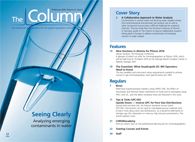Sciex and Pressure BioSciences Address Complex Sample Preparation
Sciex (Framingham, Massachusetts, USA) has announced a co‑marketing agreement with Pressure BioSciences, Inc. (South Easton, MA, USA), which aims to address the challenges arising in complex sample preparation.
Sciex (Framingham, Massachusetts, USA) has announced a coâmarketing agreement with Pressure BioSciences, Inc. (South Easton, MA, USA), which aims to address the challenges arising in complex sample preparation. This joint venture will enable Sciex to market a complete service to increase the depth, breadth, and reproducibility of protein extraction, digestion, and quantitation in all tissue types, including challenging samples like tumours.
“Advancing precision medicine through the ability to reproducibly quantitate thousands of proteins in large clinical sample cohorts is of the utmost importance to both academic and clinical research labs,” said Mark Cafazzo, Director of Academic and Clinical Research Business at Sciex.
Through combining technological knowledge Pressure BioSciences, Inc. and Sciex hope to help “scientists address the sample preparation challenges they face every day, especially when working with difficult tissue samples.”
Mr. Cafazzo continued: “The net result is more comprehensive protein quantitation from complex samples, increased productivity, and higher quality results. This is an exciting step forward for the field of proteomics, one that offers the potential to make a great and lasting impact on the quality of human life.”
Richard T. Schumacher, President and CEO of Pressure BioSciences, Inc., commented: “By combining [our] methods with Sciex’s expertise and successful history in mass spectrometry system solutions, clinical researchers will be equipped to make major leaps forward in proteomic analysis, over the current limitations of traditional methods.”
Sciex and Pressure BioSciences, Inc. hope this deal will significantly expand the footprint of MS-based quantitation workflows in clinical research settings worldwide.
For more information please visit www.sciex.com and www.pressurebiosciences.com

Determining Enhanced Sensitivity to Odors due to Anxiety-Associated Chemosignals with GC
May 8th 2025Based on their hypothesis that smelling anxiety chemosignals can, like visual anxiety induction, lead to an increase in odor sensitivity, a joint study between the University of Erlangen-Nuremberg (Erlangen, Germany) and the Fraunhofer Institute for Process Engineering and Packaging (Freising, Germany) combined behavioral experiments, odor profile analysis by a trained panel, and instrumental analysis of odorants (gas chromatography-olfactometry) and volatiles (gas chromatography-mass spectrometry).
Investigating 3D-Printable Stationary Phases in Liquid Chromatography
May 7th 20253D printing technology has potential in chromatography, but a major challenge is developing materials with both high porosity and robust mechanical properties. Recently, scientists compared the separation performances of eight different 3D printable stationary phases.
Detecting Hyper-Fast Chromatographic Peaks Using Ion Mobility Spectrometry
May 6th 2025Ion mobility spectrometers can detect trace compounds quickly, though they can face various issues with detecting certain peaks. University of Hannover scientists created a new system for resolving hyper-fast gas chromatography (GC) peaks.

.png&w=3840&q=75)

.png&w=3840&q=75)



.png&w=3840&q=75)



.png&w=3840&q=75)








